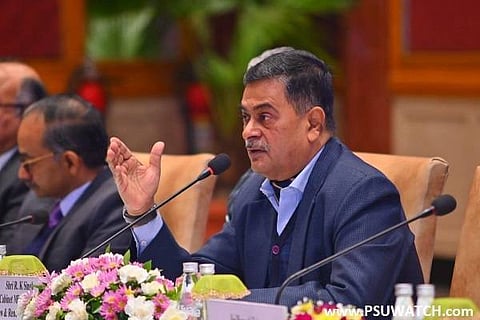
- News Updates
- PSU Watch
- Defence News
- Policy Watch
- हिन्दी न्यूज़
- Jobs Watch
- States News
- Event News

New Delhi: At a review, planning and monitoring (RPM) meeting with states on Friday, Union Minister for Power RK Singh pulled up state discoms, asked them to become professional in their day-to-day operations and warned that the disbursement of all kinds of funds will soon be tied up to improvements in operational and financial performance parameters, just like the Revamped Distribution Sector Scheme (RDSS). Terming the PM-KUSUM scheme as the Ram Baan (panacea for all ills) for the power distribution sector, the minister urged discoms to solarise all agriculture feeders.
While reviewing the status of the implementation of the PM-KUSUM scheme, the minister stressed on the solarisation of agriculture feeders and said that the move will allow state governments to save large amounts of money spent on subsidising electricity for farmers. Singh also said that apart from separate agriculture feeders, feeders having major load for agriculture will also be considered for solarisation under the scheme. Loans for feeder separation under the Component C of the PM-KUSUM scheme is made available through NABARD, Power Finance Corporation (PFC) and REC Limited.
"At a time when the state governments are facing a revenue crunch in the wake of the COVID-19 crisis, solarisation of feeders will ease the subsidy burden on them. Wherever there are diesel generators being used, please implement solarisation of agriculture pumps and feeds on priority basis," the minister told the states. He added, "The whole world is going green. We don't have an option."
While reviewing the status of action plans that states need to prepare to avail funds under RDSS, the minister stressed on two things — installation of prepaid smart meters and revision of power tariffs. Singh told states that manual intervention in the billing system should be reduced to zero and funds will only be disbursed to them if smart meters installed by them work on a prepaid basis. He also urged discoms to focus on closing the revenue gap by letting the tariff reflect the cost of electricity. "Power tariffs must reflect the cost of electricity. Bring the tariffs to the State Electricity Regulatory Commissions (SERC) and then let the state government decide to what extent they want to subsidise it," Singh told the states.
The states were told that disbursement of funds under RDSS in the first year of implementation (FY22) will be tied to performance parameters like percent metered electricity consumption against total consumption (including agriculture), subsidy payment by DBT, zero subsidy for agriculture, ensuring zero dues payable by government departments and local bodies and introduction of innovative technologies like, smart prepaid metering, SCADA, DMS, SAS, OMS and ERP, among others.
For availing additional funds under the 0.5 percentage point (pps) of extra borrowing window available to all states, states will be evaluated on the efforts undertaken by them to reform the power sector. The states were told that bonus marks will be given for undertaking privatisation of discoms and for introducing public-private partnership (PPP) models and other models to increase competition in the power distribution sector.
As on November 30, discoms owe a total of Rs 1,60,483 crore to power generating companies (gencos). Out of this, the largest chunk of dues are payable to state gencos at Rs 63,086 crore, followed by Independent Power Producers (IPPs) at Rs 52,462 crore, central PSU gencos at Rs 24,431 crore and Renewable Energy (RE) power producers at Rs 20,504 crore. At the end of September this year, the total state-level dues towards discoms were Rs 1,32,940 crore. Out of the total, while government department dues accounted for Rs 59,436 crore, subsidy receivables were at Rs 73,504 crore.
(PSU Watch– India's Business News centre that places the spotlight on PSUs, Bureaucracy, Defence and Public Policy is now on Google News. Click here to follow. Also, join PSU Watch Channel in your Telegram. You may also follow us on Twitter here and stay updated.)
